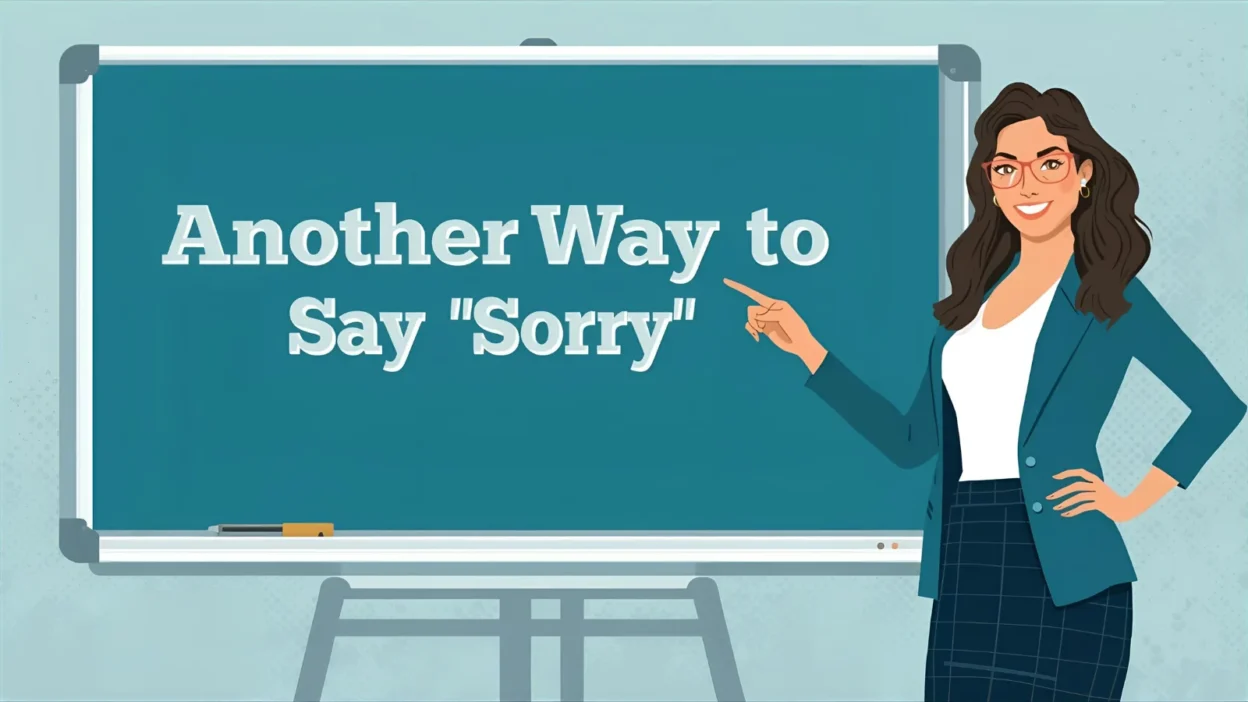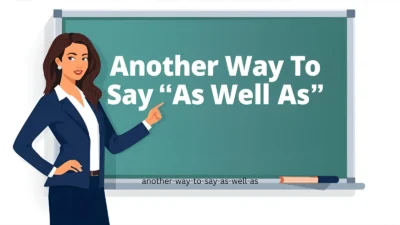The word “sorry” is one of the most common ways to apologize or express regret. While it works well in many situations, repeating it too often can make it feel routine or less meaningful. Depending on the tone, context, and level of formality, there are many alternative expressions you can use to apologize, comfort, or show sincerity.
In this article, you’ll discover 35 powerful alternatives to “sorry” with their meanings, explanations, real-world examples, best uses, and tones.
1. My Apologies
Meaning: A formal way to express regret.
Explanation: Polite and respectful, often used in business or professional settings.
Example: “My apologies for the late reply.”
Best Use: Professional emails, formal writing.
Tone: Formal, respectful.
2. I Apologize
Meaning: A direct admission of fault.
Explanation: Stronger and more formal than sorry.
Example: “I apologize for the misunderstanding.”
Best Use: Business, official statements, serious apologies.
Tone: Formal, sincere.
3. I Regret
Meaning: Expresses deep remorse.
Explanation: Indicates genuine sadness over an action.
Example: “I regret missing your wedding.”
Best Use: Formal writing, heartfelt apologies.
Tone: Emotional, formal.
4. Pardon Me
Meaning: A polite request for forgiveness.
Explanation: Softer than sorry, often for small mistakes.
Example: “Pardon me for interrupting.”
Best Use: Everyday conversation, polite interactions.
Tone: Polite, light.
5. Excuse Me
Meaning: Asking to be excused for a mistake or interruption.
Explanation: Often used in crowded or polite settings.
Example: “Excuse me, may I pass through?”
Best Use: Public settings, social interactions.
Tone: Polite, neutral.
6. Forgive Me
Meaning: A direct plea for forgiveness.
Explanation: Shows humility and seriousness.
Example: “Forgive me, I didn’t mean to hurt you.”
Best Use: Personal relationships, heartfelt apologies.
Tone: Emotional, sincere.
7. I Owe You an Apology
Meaning: Acknowledges responsibility for a wrong.
Explanation: Takes ownership before apologizing.
Example: “I owe you an apology for my behavior yesterday.”
Best Use: Conversations, reconciliation.
Tone: Honest, responsible.
8. My Bad
Meaning: Casual way to admit a mistake.
Explanation: Informal and lighthearted, used among friends.
Example: “Oops, my bad! I forgot to send the file.”
Best Use: Informal conversations.
Tone: Casual, friendly.
9. I Take Full Responsibility
Meaning: Acknowledges complete fault.
Explanation: Strong and professional way to show accountability.
Example: “I take full responsibility for the delay.”
Best Use: Work, leadership, accountability.
Tone: Formal, serious.
10. I Feel Bad About
Meaning: Expresses guilt or remorse.
Explanation: Personal and emotional, less formal.
Example: “I feel bad about missing your call.”
Best Use: Personal conversations.
Tone: Informal, empathetic.
11. Oops
Meaning: Casual acknowledgment of a small mistake.
Explanation: Used when the mistake is minor and lighthearted.
Example: “Oops, I spilled some coffee.”
Best Use: Informal settings, everyday slips.
Tone: Playful, casual.
12. I Didn’t Mean To
Meaning: Expresses that harm was unintentional.
Explanation: Good for clarifying intent while apologizing.
Example: “I didn’t mean to upset you.”
Best Use: Personal conversations, softening apologies.
Tone: Honest, gentle.
13. My Fault
Meaning: Admits responsibility simply.
Explanation: Similar to my bad but can sound more serious.
Example: “It was my fault that we were late.”
Best Use: Work, personal situations.
Tone: Casual to semi-formal, direct.
14. I Shouldn’t Have
Meaning: Admits wrongdoing in hindsight.
Explanation: Reflective and apologetic.
Example: “I shouldn’t have said that.”
Best Use: Personal, emotional apologies.
Tone: Honest, reflective.
15. I’m Ashamed
Meaning: Expresses deep regret and guilt.
Explanation: Stronger than sorry, implies self-blame.
Example: “I’m ashamed of how I acted.”
Best Use: Serious apologies, close relationships.
Tone: Emotional, heavy.
16. Please Accept My Apology
Meaning: A formal way to request forgiveness.
Explanation: Polite, respectful, often written.
Example: “Please accept my apology for the error.”
Best Use: Professional letters, emails.
Tone: Formal, respectful.
17. I Wish I Could Take It Back
Meaning: Expresses regret for irreversible actions.
Explanation: Shows deep remorse and empathy.
Example: “I wish I could take back what I said.”
Best Use: Personal conversations, emotional apologies.
Tone: Sincere, heartfelt.
18. My Sincere Apologies
Meaning: Strong and heartfelt regret.
Explanation: More formal and serious than sorry.
Example: “My sincere apologies for the inconvenience.”
Best Use: Formal letters, professional contexts.
Tone: Formal, respectful.
19. I Stand Corrected
Meaning: Admits a mistake openly.
Explanation: Often used after being corrected by someone else.
Example: “I stand corrected—you’re right about the date.”
Best Use: Conversations, professional discussions.
Tone: Respectful, professional.
20. I Regret to Inform You
Meaning: Apologizing in formal communication.
Explanation: Used when delivering bad news professionally.
Example: “I regret to inform you that your request was denied.”
Best Use: Business communication, letters.
Tone: Formal, professional.
21. That Was Thoughtless of Me
Meaning: Recognizes inconsiderate behavior.
Explanation: Admits fault while showing empathy.
Example: “That was thoughtless of me to forget your birthday.”
Best Use: Personal apologies.
Tone: Honest, empathetic.
22. I Regret Any Inconvenience
Meaning: Standard professional apology.
Explanation: Common in customer service and business.
Example: “We regret any inconvenience caused by the delay.”
Best Use: Formal writing, customer communication.
Tone: Formal, neutral.
23. I Beg Your Pardon
Meaning: Old-fashioned but polite apology.
Explanation: Can sound formal or slightly old-school.
Example: “I beg your pardon, I didn’t see you there.”
Best Use: Polite speech, formal conversation.
Tone: Polite, formal.
24. Please Forgive Me
Meaning: Direct request for forgiveness.
Explanation: Strong, emotional, and heartfelt.
Example: “Please forgive me for being late.”
Best Use: Personal relationships, heartfelt apologies.
Tone: Emotional, sincere.
25. I Didn’t Intend For That To Happen
Meaning: Clarifies unintentional actions.
Explanation: Shows regret while emphasizing lack of intent.
Example: “I didn’t intend for that to happen, and I’m sorry it did.”
Best Use: Personal and professional conversations.
Tone: Honest, explanatory.
Conclusion
While “sorry” is universally understood, it can sometimes feel overused or insufficient to convey the right tone. By choosing alternatives like formal expressions (my apologies, please accept my apology), casual ones (my bad, oops), or emotional ones (forgive me, I wish I could take it back), you can adapt your apology to any situation. Thoughtful word choice makes your regret feel more genuine, personal, and impactful.



